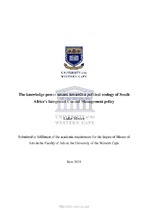The knowledge-power nexus: towards a political ecology of South Africa’s Integrated Coastal Management policy
Abstract
Integrated coastal management (ICM) has been unequivocally established in policy and legislation as the preferred framework within which environmental management in South Africa’s coastal environment should be undertaken. The production and dissemination of knowledge is seen as a critical component of the ICM framework, to the extent that ‘reliable knowledge’ is considered as one of two pillars that underpin the philosophy of the ICM process. The centrality of knowledge to ICM raises questions around objectivity, relevance, subjectivity, hegemony, hierarchy, power and negotiation within the process of knowledge production, as well as concepts of knowledge legitimacy in the promotion of specific kinds of knowledge within the ICM framework. This study responds to the prevailing notion within the environmental management field that the act of managing our environment is an apolitical or socially sterile one, by exploring the relationship between the concepts of knowledge and power as a point of departure. Thereafter, political ecology is employed as a method to contextualise and highlight some of the social processes at play within the ICM process.Using a discourse analysis approach, semi-structured, open-ended interviews with ICM role-players from civil society as well as the public, private and research sectors are used to identify and unpack key ‘storylines’ articulated by ICM role-players in the Western Cape. Five main storylines are identified, relating to: i) the criticality of knowledge to the ICM process; ii) the diversity of ICM knowledge and the difficulty encountered during efforts to integrate them; iii) the experience that decision-making in ICM takes place in an intensely political space; iv) civil society respondents’ perception of government’s role in ICM as punitive and purely regulatory; and v) that ICM is integrated in name only. The views of ICM role-players with regard to the state of ICM in South Africa, as well as the degree of homogeneity or heterogeneity in personal definitions of ICM also emerged from these engagements. ICM role-players were largely unanimous in their negative view of the current state of ICM in South Africa, with positive or neutral sentiments rarely expressed. ICM role-players expressed varied personal definitions of the term, with role-players from the research sector demonstrating the most holistic understanding of the concept.

